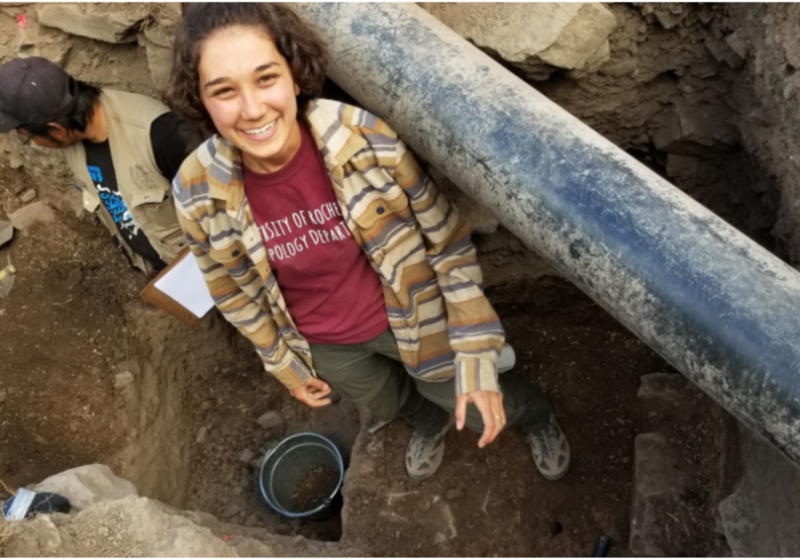You might find her 10,000 feet in the air, towering over Chavín de Huántar, exploring through Ghana, or mingling with shopkeepers in our local Public Market — Anna Remus embodies a “carpe diem” lifestyle.
As a first-year, Remus was unsure what major to pursue. This year, she will graduate with three bachelor degrees: Spanish, Anthropology, and ATHS (Archaeology, Technology, and Historical Structures). She explained her decision as following her interests, saying “I really liked history, I knew I wanted to be bilingual, and I also took some engineering classes,” she said. “I got this mix of classes that I really enjoyed.”
Remus currently works as a researcher through UR’s History Department, under Dr. Thomas Slaughter. There, she works in a Ph.D.-student run lab on the Seward Family Digital Archive, where she meticulously combs through hundreds of digitized files contained within the former Secretary of State’s manuscript collection. Due to antiquated handwriting and aged ink, the writing is often difficult to read, so Remus works to transcribe the text and uses historical records found on genealogy sites to “tag” any individuals, places, and books mentioned. Like tabs in a binder, the “tags” work to document and map out the life of this early politician. “We tag everything — whether it be the shoemaker on the corner or President Lincoln — we’ve also tagged places throughout Europe and Asia [the Middle East]. I personally tagged a bunch of Italian cities, as well as cities along the Mediterranean coast in Libya, Egypt, Algeria, Tunisia, Lebanon, and Syria.”
Through her passion to learn more about the Rochester community, she has made numerous discoveries from her manuscript research along the way. “The things that they talk about in the letters are often places that I’ve heard of. They’re talking about visiting their aunt in Canandaigua, and like I can go over to Canandaigua, too!”
Remus had a similar experience during her six month trip to Peru, where she spent one and a half months at Chavín de Huántar, a 3,000 year old archaeological excavation site eight hours north of Lima, that contained ruins and artifacts constructed as early as 1200 BCE. There, she worked 8 a.m. to 5 p.m. excavating the monument. “I learned about it in class and then I was there! That’s so cool!”
Last spring, Remus expanded her research toolkit and took ANT 200 “Anthropological Research and Methods” with Professor Doughty. Students committed to individualized research projects, which exposed them to different forms of ethnographic research and provided them with an opportunity for in-person field work. Each student chose a separate location to study, including RIT, the mall, and the Town of LeRoy. Remus selected the Public Market off of Union St., where she conducted real-time ethnographic research to fully “experience the place,” speak to vendors, and interview consumers to better understand how people perceived the market atmosphere. “I even got a life history from a third-generation spice seller at the market! And so I really like this type [in-person] research and decided to extend the project into this year.”
When the spring semester was suddenly interrupted due to COVID-19, Remus was “disappointed” that her work documenting the public market was suddenly halted, but she was still able to continue manuscript transcription through the Seward Family Research Project. She was also still able to continue her research remotely through “online ethnography.”
“I would pick a [web]page, pick a post, and read the comments and see: What people are preoccupied by? What can you learn from people’s interactions? Are they nice to each other? Are they mean? What do they care about?”
Despite the setback, Remus plans to write a research thesis through the Anthropology department on the Public Market. Remus says the move online helped her see how to better respond to her subject. “The point of anthropology is that the subject of the research is the expert, not the anthropologist with their educated background and an idea of what will happen; it’s the person you’re talking to.”
For students interested in pursuing research in the social sciences or humanities, Remus advises to just “pick a project.” “The skills you learn from research are not just applicable to one thing,” she explained. “It never hurts to just explore.”
With a variety of historical and anthropological research experiences, Remus has presented her work at UR’s 2019 Research Symposium, where she was awarded the President’s Award.
Upon graduating, Remus hopes to return to Chavin de Huantar on a Fulbright grant that she will use to study the relationship of the monument and the nearby community. Even though she has found her focus in anthropology, she maintains an explorative spirit. “Maybe I’ll be a museum curator, or go to grad school for anthro,” Remus said. “I think I need time to sort out what I want to do.”
Editor’s note (9/1/20): This article originally said that Remus spent six months at Chavín de Huántar. Actually, she spent six months in Peru, one and a half which were spent at Chavín de Huántar.





